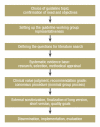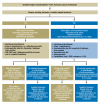Uncomplicated urinary tract infections
- PMID: 21776311
- PMCID: PMC3132618
- DOI: 10.3238/arztebl.2011.0415
Uncomplicated urinary tract infections
Abstract
Background: Urinary tract infections (UTIs) are among the most common types of bacterial infection in outpatient medicine. Rising rates of antibiotic resistance and a better understanding of the ecological adverse effects (collateral damage) of antibiotics warrant a reevaluation of the treatment recommendations for uncomplicated UTI. The new S3 guideline contains updated recommendations.
Methods: The new S3 guideline is based on a review of publications on uncomplicated UTI retrieved by a systematic search of the Medline and Cochrane Library databases. Guidelines from abroad were also considered in the review.
Results: Uncomplicated UTI is classified as either uncomplicated cystitis (UC) or uncomplicated pyelonephritis (UP). The choice of a suitable antibiotic is determined by the following main criteria: the patient's individual risk profile and prior antibiotic treatment, if any; the spectrum of pathogens and antibiotic susceptibility; the proven efficacy of the antibiotic; the ecological adverse effects (collateral damage) of antimicrobial therapy; the side effects for the patient under treatment. On the basis of these criteria, co-trimoxazole/trimethoprim and fluoroquinolones can no longer be recommended as first-line empirical treatment for UC. Rather, the new recommended treatment of first choice consists of fosfomycin-trometamol, nitrofurantoin, or pivmecillinam. High-dose fluoroquinolones are still recommended, however, as first-line oral treatment for UP. Asymptomatic bacteriuria should only be treated in exceptional situations such as pregnancy or before urological procedures that will probably injure the mucosa of the urinary tract.
Conclusion: The new S3 guideline on uncomplicated UTI incorporates a forward-looking approach to the use of antibiotics in treating this common type of infection. It is intended to bring about a sustained improvement in the quality of care.
Figures
Comment in
-
Correspondence (letter to the editor): The reality of healthcare in Germany was partially ignored.Dtsch Arztebl Int. 2012 Feb;109(5):79; reply 81-2. doi: 10.3238/arztebl.2012.0079b. Epub 2012 Feb 3. Dtsch Arztebl Int. 2012. PMID: 22368715 Free PMC article. No abstract available.
-
Correspondence (letter to the editor): Doubts and questions remain.Dtsch Arztebl Int. 2012 Feb;109(5):79; reply 81-2. doi: 10.3238/arztebl.2012.0079a. Epub 2012 Feb 3. Dtsch Arztebl Int. 2012. PMID: 22368716 Free PMC article. No abstract available.
-
Correspondence (letter to the editor): Prevalence rises in postmenopausal women.Dtsch Arztebl Int. 2012 Feb;109(5):80; reply 81-2. doi: 10.3238/arztebl.2012.0080b. Epub 2012 Feb 3. Dtsch Arztebl Int. 2012. PMID: 22368717 Free PMC article. No abstract available.
-
Correspondence (letter to the editor): Authors' objectivity is in doubt.Dtsch Arztebl Int. 2012 Feb;109(5):80; reply 81-2. doi: 10.3238/arztebl.2012.0080a. Epub 2012 Feb 3. Dtsch Arztebl Int. 2012. PMID: 22368718 Free PMC article. No abstract available.
-
Correspondence (letter to the editor): Is this how times are changing?Dtsch Arztebl Int. 2012 Feb;109(5):81; reply 81-2. doi: 10.3238/arztebl.2012.0081a. Epub 2012 Feb 3. Dtsch Arztebl Int. 2012. PMID: 22368720 Free PMC article. No abstract available.
References
-
- Gupta K, Hooton TM, Naber KG, Wullt B, Colgan R, Miller LG, et al. International clinical practice guidelines for the treatment of acute uncomplicated cystitis and pyelonephritis in women: A 2010 update by the Infectious Diseases Society of America and the European Society for Microbiology and Infectious Diseases. Clin Infect Dis. 2011;52:e103–e120. - PubMed
-
- Wagenlehner FME, Schmiemann G, Hoyme U, et al. Epidemiologie, Diagnostik, Therapie und Management unkomplizierter bakterieller ambulant erworbener Harnwegsinfektionen bei erwachsenen Patienten. S-3 Leitlinie der Arbeitsgemeinschaft Wissenschaftlicher Medizinischer Fachgesellschaften (AWMF) AWMF-Register-Nr 043/044 2010 [cited 2010 October] Available from: www.uni-duesseldorf.de/AWMF/
-
- Grabe M (chairman) BM, Bjerklund-Johansen TE, Botto H, et al. EAU. Guidelines on urological infections. European Association of Urology Guidelines, Arnhem, The Netherlands. European Association of Urology. 2010:1–110.
-
- Phillips B, Ball C, Sackett D, Badenoch D, Straus S, Haynes B, Dawes M. Oxford Centre for Evidence-based medicine—levels of evidence (March 2009) 1999. [Available from www.cebm.net/index.aspx?o=1025] 2010
MeSH terms
Substances
LinkOut - more resources
Full Text Sources
Medical



